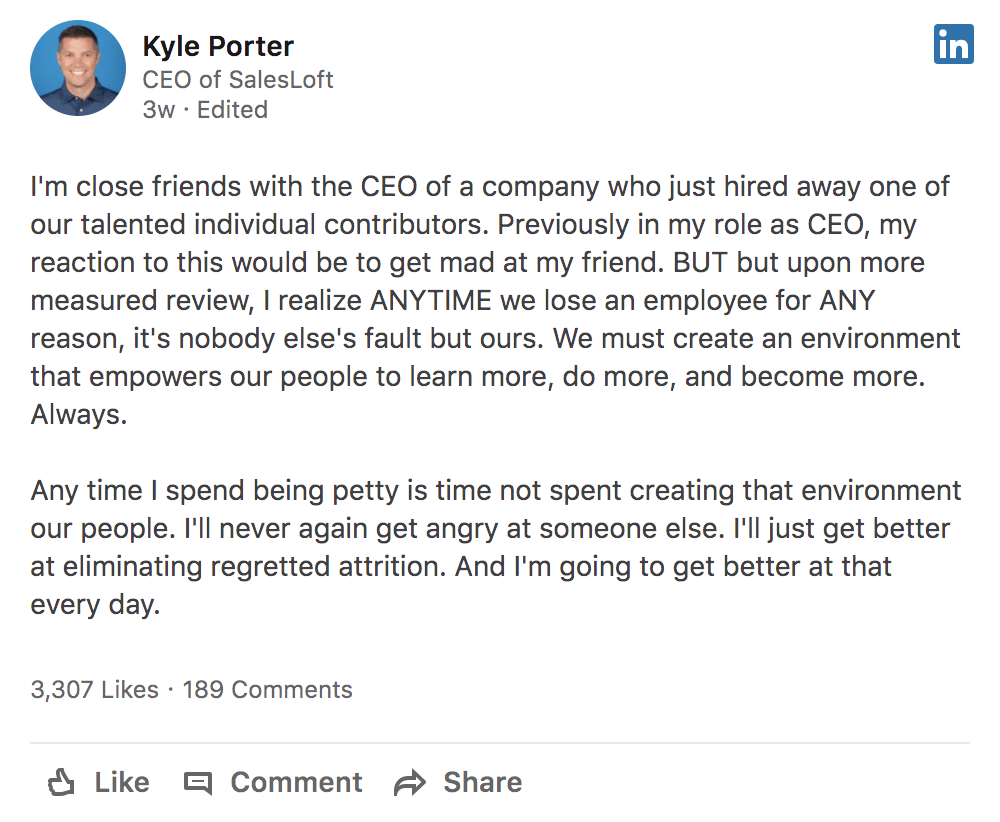Business markets operate in cycles. The Stock Market moves up and down. The housing market favors buyers or sellers depending on the month. The talent market is no different. At times, you may find it to be an employer's market while at others it quickly shifts to an employee's.
According to the Trading Economics, an online data platform, the U.S. unemployment rate dropped to 3.7 percent in September of 2018. That is a noticeable decrease from the previous 3.9 percent over the preceding two months. What a far cry from the 2009 Recession as unemployment rose to 9.6 percent.
While having a low unemployment rate is a wonderful thing, it greatly decreases the pool of talent for employers. It has become difficult for businesses to snag top talent as there are so few qualified candidates and even more who lack modern skills for success.
Because of the current market trend in unemployment, developing current talent is exponentially more important than ever before. Companies must invest in their employees if they want to have a fighting chance of retaining them.
Kyle Porter, CEO of SalesLoft, a leading sales engagement platform, recently penned a viral LinkedIn post detailing this responsibility. The inspiration came after Porter lost one of his top performers to a competitor.

Porter's realization is authentic, and most importantly, correct. When employers had a leg up on the talent market trends, the paycheck was enough to draw in potential employees. That could not be further from the truth at present. Recruiters, HR professionals and even CEO's are simply being forced to poach talent from other organizations due to the increasingly dry unemployment pool.
What Companies Can Do?
In the financial markets, the very best investors find unique and creative ways to play offense. They aim to make the maximum amount of return or alternatively, lose less than the average. Applying this approach directly to recruiting can be a boost for any company.
The best leaders have found a way to play offense in a seemingly defensive market. Jason Lippert, CEO of Lippert Components, is a top-notch example. His components manufacturing company had a turnover rate hovering around 130 percent and a shrinking list of potential job candidates. Lippert chose to address the traditional industry-wide manufacturing problems differently and aggressively hone the leadership skills of his employees at every level and proactively deliver the company culture.
Over a four year period, the Lippert Component team created a leadership academy to train people from the front lines up to the C-Suite. The principles of servant leadership and a proactive culture were engrained in the hearts and minds of the team members and the results followed. Turnover dropped to 30 percent, well below the industry average and job candidates filled out applications at a pace they had never seen.
Your company doesn't have to be the size or have the budget of Lippert Components to have a leadership development academy. What you need are business leaders who value the development of people and understand success isn't sustainable without great leadership at all levels. If you are up for making the leap ensure your leadership academy includes these three things:
- 360° Assessments - There is nothing worse than business leaders thinking they are leading well, only to find out from their people how wrong they are. Use employee feedback to improve the self-awareness of your leaders.
- Modern Content - Many of the foundational principles of leadership in today's workplace remain the same as decades prior, but also many have changed. Ensure your content is up to date with the challenges facing today's leaders as well as the way in which the content is delivered.
- Continuous Learning- Much of the real true development of leadership skills take place on the job. Provide opportunities for reinforcement and coaching to ensure what is learned in training can be applied.
Regardless of the ebbs and flows of the future talent market, the mentality of potential employees will remain the same. The new normal is a belief that it is the responsibility of an employer to develop their skills in the long-term.




Leave your comments
Post comment as a guest